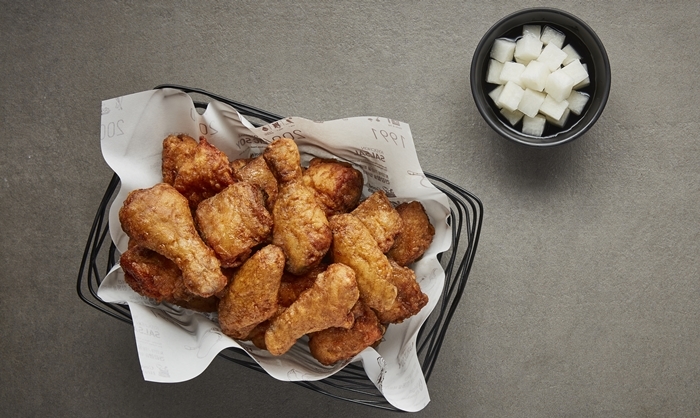
While many foreign fast-food chains struggle in the Korean market, Kyochon, a local fried chicken franchise that caters to Korean taste buds, remains at the top of the fried chicken game. Pictured is one of Kyochon's 'Original Series' menu items: a basket of fried chicken flavored with garlic and seasoned soy sauce. (Kyochon)
By Kang Gahui and Lee Hana
World-famous fast-food franchises are struggling to stay afloat in the Korean market. In this year alone, two out of the three major global fast-food franchises in Korea were sold to new owners.
On Aug. 31, it was announced that Yum! Brands, a fast-food chain company based in the U.S., sold off its full stake in Pizza Hut Korea to Orchard One, a Korean investment company. This was the second time a non-Korean franchise was bought out, after KFC Korea was taken over by KG Group, a Korean conglomerate, in the beginning of this year. McDonald's Korea will likely face a similar fate, too, it's predicted, as its U.S. parent company has been on the lookout for a suitable new owner since last year. The transaction is on hold, for now, though.
Industry experts have pointed to rapid changes in the market and stronger competition as the main reasons for failed performance and eventual sell-outs. Around the year 2000, Korea's dining-out industry underwent major changes. Customers had more menu options and a wider price range from which to choose, from cheap to premium. The rise of single-person households and a growing interest in maintaining a healthy lifestyle have also played a part in shaping the franchise market.
Specifically, Korean customers' taste in menu items and the way in which a lot of food is delivered here also affected the performance of global fast-food franchises.
U.S.-style fried chicken became coated with sauce made of gochujang red pepper paste, garlic and starch syrup after it arrived in Korea, to become what's commonly known as yangnyeom fried chicken. These days, Kyochon is best known for its fried chicken tossed in a garlic soy sauce. Goobne Chicken prides itself on its oven-baked menu items, and Nene Chicken comes with a side of seasoned pachae green onions. Against these brands that are armed with menu items catering specifically to Korean taste buds, KFC Korea took a toll and its sales dropped rapidly.
KFC did eventually develop a localized menu including herb garlic flavors and roasted chicken, and in 2014 it started delivering in Seoul and Gyeonggi-do Province. However, these changes seem to have arrived too late, and it continued to struggle against local competitors.
Pizza Hut opened its first Korean eatery back in 1985, in Seoul's neighborhood of Itaewon. By 1992, it created its bulgogi pizza and its "rich gold" pizza, topped with a sweet potato mousse, both great successes, and ruled the early days of the pizza market. By the mid-2000s, however, even Pizza Hut took a blow from brands like Domino's and Mr. Pizza, and smaller stores with cheaper slices. Pizza Hut, which had originally set itself up as a family restaurant fitted with a large salad bar, was hit hard by its competition. Domino's, another global chain, took advantage of delivering in 1990 and set its business strategy around that and take-out sales, offering a 40 percent discount to customers who made orders online and then picked them up in person. Naturally, brands that adopted this approach soon dominated the pizza industry.
Though the domestic franchises for KFC and Pizza Hut have now been bought out by local operators, it doesn't mean that these brands will leave the Korean market.
Eom Ik-soo, CEO of KFC Korea, held a press conference on Aug. 11 and told reporters that, "With the second half of 2017 as our starting point, KFC will strive to become an honest brand, one that places customers first, with the goal of opening 500 stores nationwide by 2023."
Steven Lee, CEO of Pizza Hut Korea, said, "Pizza Hut Korea will take this opportunity to bring more innovative pizzas and better services to our customers, and increase brand satisfaction."
Whether these brands, now under the auspices of new owners, will be able to overcome their past operational failures and rise again with all the glory of their global parents, only time can tell.
kgh89@korea.kr